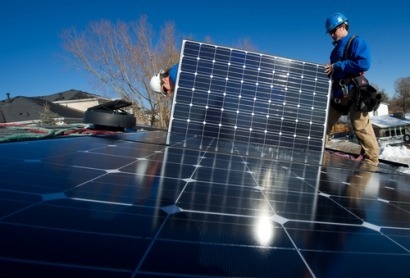
Despite widespread opposition from many EU member states, the European Commission (EC) decided yesterday to impose provisional anti-dumping duties of 47.6 percent which will be levied against Chinese imports of solar panels, cells and wafers as from August 2013.
“Today the European Commission has decided to impose provisional anti-dumping duties on imports of solar panels, cells and wafers from China” an EC representative announced yesterday. “This decision follows a thorough and serious investigation and extended contacts with market players. As the market for and imports of solar panels in the EU is very large, it is important for this duty not to disrupt it. Therefore, a phased approach will be followed with the duty set at 11.8% until 6 August 2013. From August on the duty will be set at the level of 47.6% which is the level required to remove the harm caused by the dumping to the European industry.”
The representative confirmed that the EC remains willing to pursue discussions with Chinese exporters and with the Chinese Chamber of Commerce in order to find a solution to the dispute. However, any solution would have to adhere to Article 8 of the EC Basic Anti-Dumping Regulation before any provisional duties can be suspended and a negotiated solution achieved.
A less severe duty of 11.8 percent will be levied up until 6th August 2013 at which point it will be replaced by the more severe duty of 47.6 percent which will be maintained for four months. In practice this will mean that a duty will be imposed for a total of six months. The EC have commented that the level of the duty is far lower than the 88 percent rate at which Chinese panels are being dumped on the European Union (EU). It has further commented that “highly innovative EU companies are currently being exposed to immediate threats of bankruptcy because of unfair competition from Chinese exporters, who have taken over more than 80 percent of the EU market and whose production capacity currently amounts to 150 percent of global consumption.”
Although many EU member states and sector-specific business organisations have, at time of writing, yet to respond, the Chinese themselves have already hit back with a retaliatory anti-dumping duty and special subsidy investigation against European wine imports. The aim, according to Beijing, was to target those nations, such as France and Italy, that had supported the EU anti-dumping tariff while leaving those opposed largely unaffected. The Chinese Commerce Ministry has already issued a statement saying that China has consistently attempted to resolve the matter through discussion.
“The Commerce Ministry has already received an application from the domestic wine industry, which accuses wines imported from Europe of entering China's market by use of unfair trade tactics such as dumping and subsidies” said a spokesperson from the Chinese Commerce Ministry. “We have noted the quick rise in wine imports from the EU in recent years, and we will handle the investigation in accordance with the law.”
Germany is one of the few EU nations to have already issued a cautious first response. German Economics Minister Phillip Roesler renewed Berlin’s call for a negotiated solution and warned that the matter could spark off a trade war with China.
Speaking on German national television Mr Roesler said:
“The EU must always negotiate and I think there's still the chance to quickly sit at the table and agree on a fair framework and definitely avoid a trade war that would affect many more areas than the photovoltaic sector.”
The Chinese response is likely to hit France the hardest given that China is the third largest export market for French wine. In 2012 the Chinese market for French wines and spirits was worth €1 billion ($1.31 billion) representing nine percent of French wines and spirits exports.
Further information:

